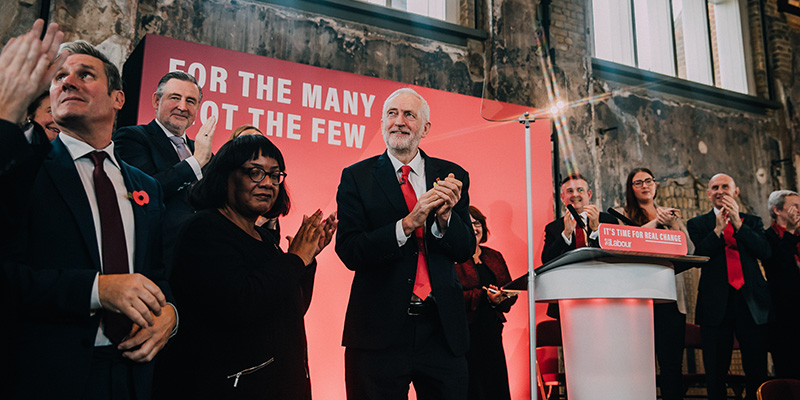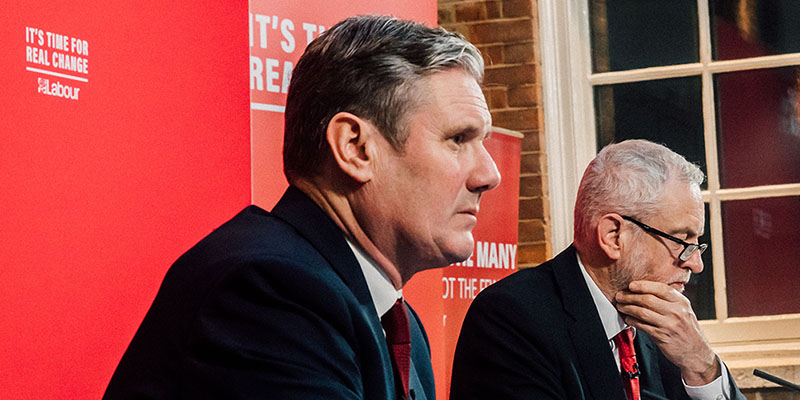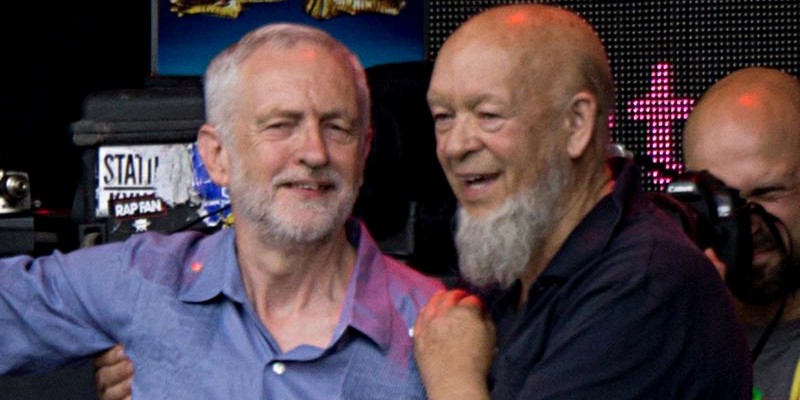So many rival projects and not a serious idea amongst the lot of them. A week ahead of the Liverpool conference, Carla Roberts looks at what little remains of the once mighty Corbyn movement
The soft left has been in political and organisational disarray for some time, but its lack of purpose is perhaps symbolically expressed by the ‘Stop Starmer’ campaign.
Supported on Zoom by a number of individuals linked to the Not the Andrew Marr show, it has organised a protest for October 7, the day before the start of Labour Party conference – not in Liverpool, mind, where the conference will take place, but outside Sir Keir Starmer’s constituency office in London. The campaign is supposed to “bring people together who oppose the Labour leader” and “highlight the danger of a Starmer government”. Apparently, Starmer is “the most untrustworthy political leader this country has seen”.[1]
Quite a statement. But is Starmer really worse than the notorious liar, Boris Johnson? What about Tony Blair, who launched a war against Iraq based on outright lies? Or Winston Churchill, the guy who sent the army and tanks against striking miners in Wales? To paraphrase Harry Truman: show me a politician, and I’ll show you a crook.
Yes, Keir Starmer was the one who had to do the dirty work of cleansing the Labour Party after its infection with Corbynism. Would Yvette Cooper have been doing a less nasty job? Wouldn’t she have jumped on the anti-Semitism smear campaign to weed out the left? Would David Lammy not have grasped the opportunity to suspend Corbyn and his allies in the Parliamentary Labour Party? Would Andy Burnham have stopped short of proscribing critical organisations like Labour Against the Witchhunt? We know the answer.
Promises
It seems some of the organisers of this campaign feel personally hurt that Starmer has broken some of his lame promises – which he was clearly never going to deliver anyway. Starmer is not acting the way he is out of some personal spite or because he is a particularly nasty specimen of a human being. He is showing the ruling class that the Labour Party can once again be trusted to be a loyal servant of capital. Labour’s contradictory nature as a bourgeois workers’ party means that on this or that occasion it is pulled to the left – and after Corbyn, Starmer is now pulling it back to where it normally is, on the right. In other words what the mainstream media calls the ‘centre-left’. Starmer is a typical former state apparat, he comes from the left in his youth but long ago saw the light and reconciled himself to serving, not opposing the system. True, given where the world is at the moment he will probably be the most rightwing Labour PM in history. But the same goes for any other realistic alternative Labour candidate for the job. To pretend otherwise is to misunderstand what the Labour Party is and, worse, how capitalism as a system works.
In any case, socialists should never blindly ‘trust’ any ‘political leaders’. We should always critically engage and question whoever is leading working class organisations. Otherwise we are building up messiahs who have to be followed unquestioningly – a feature we see far too often on the left. Many organisations foster a culture of blind obedience, which will produce nothing but sects. A healthy working class party needs discussion and debate and a culture of free speech, where ideas can be challenged and contested. Otherwise it will wither away and die, sooner or later. And the ‘Stop Starmer’ campaign is a sign of the demoralised Corbyn left taking the short road to oblivion.
The main problem of the campaign is obviously the lack of any kind of political outlook that goes beyond ‘anyone but Starmer’. Who then? Another Labour leader? A different party? What kind of party? With what programme? This lack of a positive perspective of any kind – let alone a socialist one – has allowed all sorts of flotsam and jetsam to support the campaign. At the launch event in Conway Hall in September, for example, decent socialists like Andrew Feinstein and Audrey White rubbed shoulders with the Brexiteer and Ukip ally, George Galloway, who was able to advertise his national-chauvinist Workers Party of Britain. That is very much the opposite of useful.
The campaign is loosely linked to the snappily titled Organise Corbyn-Inspired Socialist Alliance, (OCISA)[2], which wants to stand a candidate against Starmer in his constituency of Holborn and St Pancras at the next general election on the basis of, you guessed it, the Labour Party’s 2017 manifesto. Like so many, those comrades are labouring under the illusion that it was this reformist programme in itself that inspired hundreds of thousands to support the Labour Party under Corbyn.
It seems unlikely that many of them actually read the rather turgid and dull document (which did not mention key issues like the monarchy or electoral reform, just constitutional tinkering). It was the prospect of some kind of ‘change’, however small, that excited many – and Corbyn seemed to have it within his reach to effect such change. Some local anti-cuts activist, no matter how deserving, standing on the same programme will be lucky to get more than 100 votes. Both campaigns are designed to fail, meaning that we will end up with something that is not exactly what the left needs: yet more demoralisation.
For the Many
You cannot blame Ken Loach for not trying – here he is, once again, doing his best to get some kind of organisation off the ground. He helped to launch Left Unity in 2013, which quickly went into hibernation after Corbyn was elected Labour leader in 2015. Loach joined the party and turned his back on LU, which is now involved in the new organisation, Transform. Transform also includes the Breakthrough Party, the Liverpool Community Independents and the People’s Alliance of the Left (which in turn counts the Northern Independence Party and the Socialist Party’s Trade Unionist and Socialist Coalition among its affiliates). Transform, which wants to become a party, will be officially launched on November 25 in Nottingham. For the Many, which describes itself as a “network”, will be launched on October 9 during the Labour conference. If any reader knows of any substantial political differences between those two outfits, I would be keen to hear about them.
Quite why Ken Loach is not backing Transform is slightly opaque and seems to be down to the personalities involved. Many of the organisers who are driving Loach’s project are based in Liverpool – where the Community Independents are despised by much of the more principled left. The eight former Labour councillors at the core of LCI might have voted against budget cuts on Liverpool council, but they also voted in favour of the arms fair and kept their mouths firmly shut during the anti-Semitism smear campaign. Alan Gibbons even helped push the witch-hunt when he was running Momentum under the constitution written by pro-Zionist Jon Lansman, according to which anybody expelled from the Labour Party had to be expelled from Momentum. In a classic and predictable turn of events, he was ‘let go’ from Momentum himself when the witch-hunters eventually came for him.
We hear there are ongoing and quite heated arguments over whether For the Many should reference Corbyn. Some participants have objected, we hear, not because of any political differences – but because he comes with the ‘anti-Semitism’ baggage. I would have thought that naming the organisation after his 2017 manifesto would be a bit of a giveaway, as is the involvement of his wife, Laura Alvarez. But perhaps some people can be fooled some of the time that way.
For the Many describes itself as a “grassroots alliance seeking to unite the left, based on 2016-19 Labour principles, through a network for communication and coordination”. Presumably “grassroots” here refers to a number of individuals who were meeting behind closed doors to set up the new formation over the last few months (rather than the organisations involved in Transform, who were doing the same behind a set of different closed doors). Apart from Loach and Alvarez, the other leading people involved are Andrew Feinstein (a former minister under Nelson Mandela), Audrey White (Merseyside Pensioners Association) and Naomi Wimborne-Idrissi (Jewish Voice for Labour). I would not describe them as ‘grassroots’ in any sense.
We have yet to see any programme or political statement from For the Many (if it indeed goes beyond Corbyn’s manifestoes), but if the organisers are too scared to deal with the anti-Semitism smear campaign head on then it will be of very limited value. After all, the campaign to conflate anti-Zionism and criticism of Israel with anti-Semitism is continuing to grow and has spread from the Labour movement into workplaces, town halls, schools and universities.
This kind of debate also shows that some people have learned very little from the witch-hunt in the Labour Party. Appeasing the right and their smears, lies and slanders will not make us stronger – it will help our enemies, those we have to fight politically. Beyond taking on the witch-hunt, we would argue for any new organisation to have a clear socialist programme. And by that we do not mean motherhood, apple pie and platitudes, but a Marxist programme that takes the fight for political democracy seriously.
Transform
Unsurprisingly this is something that Transform, with its 10 short ‘core principles’, does not do.[3] It does not even reach the dazzling heights of Corbyn’s manifestoes. It wants to be a “left party” – not a socialist one. There is only one reference to socialism in the widest sense: it claims that Transform “is eco-socialist, supporting transformative political, social and economic change in order to build a truly sustainable world and achieve climate justice” (my emphasis). It wants to “redistribute wealth and power from the elite to the people” – a classic Lassallean formulation that Marx famously riled against. Marxists do not fight for ‘fairness’, ‘justice’ or a more equal distribution (or the even stranger ‘redistribution’) – they fight for the working class to become the ruling class, which owns and controls the means of production.
Having set up The World Transformed after Corbyn’s election, Momentum is now merely one of the 33 ‘partners’ of this annual jamboree, which runs parallel to the Labour Party conference and has absolutely no impact on it. As always, it will be snazzily and expensively produced and has a worthy, if slightly dull, programme, with lots of ‘can do’ workshops, films and speeches by big names (Jeremy Corbyn and Jamie Driscoll among them). It is going nowhere politically, but that is exactly the point of this festival, which has taken on a life of its own. A bit of harmless fun.
Momentum itself is still trying to find its feet in the post-Corbyn labour movement. It recently reconfirmed the Lansman rule that only Labour Party members can join. Non-Labour members (including those suspended or expelled in the witch-hunt) may become “Momentum movement builders” and may support the organisation financially, etc – but without having a vote or any say.[4] Not exactly a very attractive proposition and, unsurprisingly, Momentum provides no membership figures nowadays.
Momentum excited
It has clubbed together with what remains of the Campaign for Labour Party Democracy to stand a couple of ‘joint slates’ in the various internal Labour elections coming up during and after conference. Both will also inform delegates via text messages and emails about they should be voting at conference. I would venture a guess that sooner or later those two organisations will merge – probably when enough people remember that they still have a subscription to Momentum and cancel it.
There is, however, no sense of any kind of fightback. The only thing Momentum has been getting slightly excited about is the planned abolition of the ‘equality roles’ for disabled, black and gay members in Constituency Labour Parties, proposed by Labour’s national executive committee. Of course, this is an attack from the right on what remains of the left, but we should seriously question how useful these positions really are.
In truth they are a patronising way to show that ‘we are taking the issue seriously’. Often, the opposite is the case: it leaves such matters to the ‘equality officer’ rather than making them into questions for the whole CLP. They are a reflection of the dead end of ID politics, where what you are is far more important than what you believe in or fight for.
Momentum disagrees, of course: “We must stop this – and we can!”, it proclaims in an email to anybody on its database: “To come into force, the rule change needs to be passed at Labour conference on Sunday 8th October. We urge all Labour Party stakeholders to reject this rule change on the conference floor.” If the petition on the subject is anything to go by, there is not a chance of that happening.[5] Although this is right up the street of the official Labour left, it has gathered a less than impressive 835 signatories. A figure which tells us everything about the current state of the official Labour left – and, of course, Momentum itself.
[1]. Morning Star September 5 2023.







